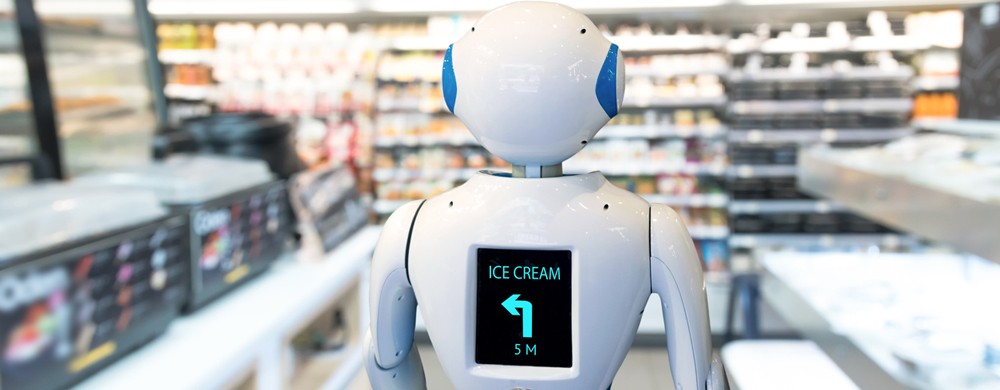Will Robots Change the Future of Marketing?

Let’s face it; the future is here with us thanks to Artificial Intelligence (AI). AI is undergoing rapid evolution, and this has attracted multiple questions concerning its future. Notably, most industries in the world, including digital marketing industries, will benefit from this paradigm shift in technology, depending on how they embrace it. As it stands, robots seem to be taking over interactive marketing that has traditionally been done by humans. Unlike the use of social media, blogs, and emails for advertising, interactive marketing is customized to facilitate two-way communication with the clients as they link up directly with the organization. This ensures company marketers understand customer preferences, and guide them in making informed choices when making purchases. As Artificial Intelligence takes on a new form, the question is; will robots change the future of marketing?
What exactly is a Marketing Robot?
To qualify as a robot, a programmable machine requires some level of intelligence and a mechanical component. This includes the ability to analyze its tasks rather than operating like an automatic machine. This, in turn, takes away the place of human effort. However, a robot doesn’t carry out complex and repetitive tasks like bank ATMs that cannot replace bank tellers. Instead, a robot is an automatically controlled and multipurpose manipulator. It is programmable in more than three axes and can analyze tasks like understanding human feelings and preferences.
While some robots called androids are designed in human form, most other robots take various styles to suit their applicability. Modern robots can be semi-autonomous or autonomous and use speech identification technology as well as artificial intelligence (AI). Hence, most robots, such as industrial robots found in production lines or factories and Pepper found in the marketing industry, can perform specific tasks with ease.
Marketing jobs taken over by robots
Notably, robots can work well with repetitive and fixed tasks like in the hospitality industry, cashier work, and tax preparers. The following are some essential jobs for robots in the marketing industry.
Outgoing-call handlers and call center staffers
Every organization requires a means of telecommunication to connect with customers and suppliers. In this case, the robots can handle Internet traffic and incoming phone calls to ensure smooth communication and simplify the work at the company’s call center. Nowadays, automated robots handle prerecorded calls such as customer satisfaction surveys and appointment reminders. Automated call centers also use a customizable interface to welcome, greet, and direct callers to the right department or information.
Copywriters and website content creators
Content creation is now being taken over by robots. Notably, most organizations are now using robots to help in copywriting and creating website content. In the Los Angeles Times, for example, robots give reports on earthquakes as the organization depends on the algorithm that gathers magnitude data, time, and place from a geological site. Reporters in the sports industry also use robots as sportswriters to produce games coverage. Moreover, news agencies now use artificial intelligence technology to provide automated news from previous articles and even live data sets.
Trade show performers and entertainers
Some types of robots in the marketing world work as audience entertainers and mostly operate in trade shows. Additionally, robots and robotic exhibitions now feature in film and television programs, theme park attractions, and storefronts. While some of these robots take the form of fantasy figures in the fictional world, others are skillfully designed to look like real people.

Better customer care by robots
Robot companies are working tirelessly to produce inventions and new devices that create a sense of technological progress and innovation. This explains why, robots are now involved in marketing tools as interactive marketing representatives and customer service attendants. For better customer service, companies have introduced chatbots on their websites where customers can have one-on-one chats as they navigate the sites for the products they need.
You may not have noticed, but a software-driven robot called “spider” is already at work and used to display articles on the pages of your search results. The pages are analyzed from the millions presented to you after careful ranking. Furthermore, industrial robots now work alongside human employees to move materials, assemble parts, and other automotive factory tasks. Probably, you wake up every morning to a gentle and cheerful notification on your mobile device announcing that you have a new email from a brand, website, or blog where you are a follower. All these are the works of a robot programmed to act just at the right time. With all said and done, it becomes clear that, the emergence of robots in various economic sectors, including marketing, has had positive impacts by boosting human effort for better results.
Picture Credit:
https://www.showmans-directory.co.uk/uploads/images/x(2).jpg
Source List:
https://sastrarobotics.com/%EF%BB%BFcan-robots-do-marketing/
https://www.msi.org/reports/service-robots-rising-how-humanoid-robots-influence-service-experiences-and/
Thanks for helping to keep our community civil!
This post is an advertisement, or vandalism. It is not useful or relevant to the current topic.
You flagged this as spam. Undo flag.Flag Post

